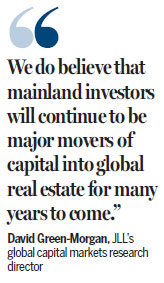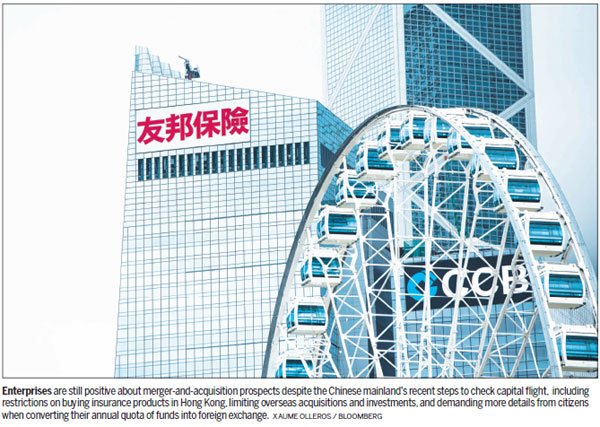Momentum behind outbound M&A deals to stay
Updated: 2017-03-03 09:21
By Oswald Chan in Hong Kong(HK Edition)
|
|||||||
Mainland firms seen unlikely to be deterred from snapping up overseas assets despite curbs on capital exodus
Outbound merger-and-acquisition (M&A) activities by Chinese mainland enterprises should not be discouraged by recent policies restricting capital outflow as they have a concrete need to take their businesses abroad, legal and auditing advisory firms believe.
Faced with a depreciating yuan and declining foreign-exchange (FX) reserves, the central government has acted to stem capital flight. Standard Chartered estimated that capital outflows for last year reached $728 billion, Bloomberg reports.

The People's Bank of China spent $778 billion over the past two years to slow the yuan's depreciation against the US dollar, cutting FX reserves from $3.8 trillion at the end of 2013 to below $3 trillion early this year, raising concerns over the sustainability of that policy, global think-tank Oxford Economics said.
Recent measures included restrictions on buying insurance products in Hong Kong, limiting overseas acquisitions and investments, and demanding more details from citizens when converting their annual quota of funds into foreign exchange.
The Ministry of Commerce and the National Development and Reform Commission said they would be stricter on M&A deals involving outbound investment of more than $10 billion.
Reports said purchases of more than $1 billion would be scrutinized if they were outside the investor's core business, unless the mainland government had agreed to the acquisitions.
Reports also said State-owned enterprises would not be allowed to invest more than $1 billion in a single overseas real-estate transaction unless permitted by the mainland authorities.
The State Administration of Foreign Exchange (SAFE) was reportedly vetting cross-border money transfers worth $5 million or more. The previous threshold was $50 million.
"When bidding for coveted assets abroad, the capital control measures may potentially put mainland enterprises going abroad at a disadvantage," said Betty Louie, Partner (Italy) at global international law firm Orrick, Herrington & Sutcliffe.
"If a foreign seller has a number of bidders and one is a Chinese mainland enterprise, the perception that foreign exchange controls on the mainland can further tighten or limit thresholds can be reformulated, could cause the mainland bidder to appear less attractive relative to other bidders who may not face similar restrictions," Louie explained.
Other analysts are more optimistic, saying recent measures curbing capital outflows should not curtail outbound M&A deals in the long run.
Zhang Danian, chief representative at Baker McKenzie's Shanghai office, said:"This is a policy balancing act. The overall policy continues to encourage mainland companies go global and, on the other hand, it's necessary to deal with the pressure from [yuan] depreciation as well as the quick outflow of foreign exchange in the short term. This is a question of balancing long-term and short-term policy.
"While the SAFE policy may create some approval hurdles and extend the project's time, it will not change the general direction of the mainland's outbound strategy and policy," Zhang predicted.
The number of mainland M&A deals has ballooned since 2013 when more mainland private entrepreneurs began snatching trophy assets such as Italian football teams, US film studios and French fashion houses. Before 2013, the mainland outbound M&A deals were dominated by State-owned enterprises vying for natural-resource assets.
Global accounting firm PricewaterhouseCoopers (PwC) predicted that mainland outbound M&A activities would continue to reach record levels next year as outbound investment over the medium to long-term would be encouraged if the acquisition was considered strategic in nature.
For this year, the auditing firm said mainland outbound M&A deals may decline somewhat as new regulations slowed outbound M&A activity.
PwC said last year saw record levels of mainland outbound M&A deals both in terms of value and transaction volume. The number of mainland outbound M&A transactions grew 142 percent last year while their value jumped 246 percent to $221 billion. The M&A transaction value last year was nearly 3.5 times the previous record set in 2015. Of the outbound transactions, 51 were worth more than $1 billion - more than doubled the previous record.
Jones Lang LaSalle (JLL), a global real-estate advisory firm, noted that mainland capital would be a major force in the world's real-estate investment market.
"We do believe that mainland investors will continue to be major movers of capital into global real estate for many years to come," said David Green-Morgan, JLL's global capital markets research director. "But, a similar increase in 2017 may be challenging given the recent discussion about monitoring its capital outflows on mainland."
The Chinese mainland hit a record of $33 billion in overseas commercial and residential property investments last year, an increase of nearly 53 percent year-on-year, according to JLL.
oswald@chinadailyhk.com

(HK Edition 03/03/2017 page8)